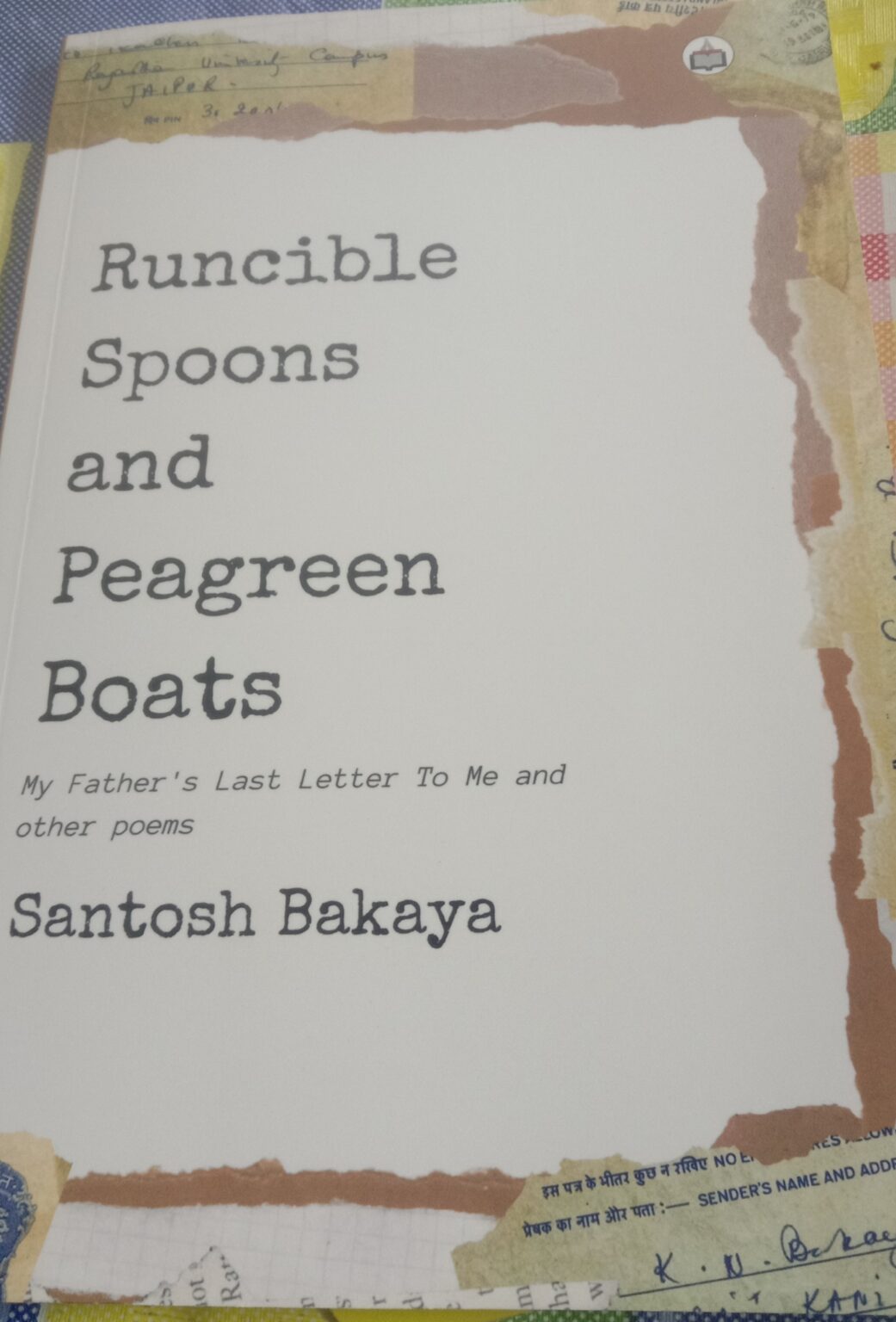It’s a collection of poems that celebrate relationships and linger on.
By Brindha Vinodh
Dr. Santosh Bakaya’s ‘Runcible Spoons and Peagreen Boats’ is a collection of beautifully written poems that recall her halcyon days of nostalgia with enthusiasm, pride and pain – the pain of missing her ancestral home in Kashmir and those rejuvenating memories attached around her attic, and the pain of wistfulness that surrounds her as she recalls her parents and granny dotingly.
Before one moves on to her poems, one’s eye is caught by the wonderful introduction written by Dr. Ampat Koshy, a poet and academician himself. The introduction is erudite and insightful.
The thought process that has gone into designing the front cover in such a way as to include the poet’s father’s last letters to her in the margin is highly appreciable and is an intelligent depiction of the bond shared between the poet and her dad and an enlightenment in the form of art, of what follows in text as poetry in the ensuing pages.
In her ‘author’s note’, the poet instills in the reader, in her inimitable style, how she got to know more about ‘runcible spoons’ and how her father, an English professor, introduced her to the phrase from ‘The Owl and the Pussy Cat’: ‘the owl and the pussy cat went to sea in a beautiful pea green boat
they took some honey and plenty of money all wrapped in a five pound note’.
And how her fixation with Edward Lear began. This aptly justifies the reason for the poet choosing this title and how she developed a great sense of wit and humour.
Dr. Bakaya has a remarkable knack of attracting reader’s attention with alluring alliterations and uniquely charming rhymes. In her very first poem, Footfall, she writes:
No sooner had I started shelling
peanuts,
a squirrel scampered towards me,
its front pincer teeth active.
Frantically, it jabbed on a robust piece of peanut,
holding it between its front legs.
I watched curiously, it nibbled furiously
at this Winter snack,
as the dawn opened its eyes one more crack.
Ah, the rejuvenating smell of a new morn,
the rustling of trees, the twittering of birds
far from the twitterati’s war of words
What an effortless way of connecting the past and the present and juxtaposing nature’s sweetness with man’s arguments.
In ‘Grandma’s Toothless Grin’, she remembers her granny with an unusual yet allusively profound metaphor thus:
my grandma was a Mary Oliver poem,
simple but majestic
And in ‘I See Her Still’, she recalls her granny again affectionately.
I still see her, so calm, so serene,
ears apparently pricked to kids’ prattle
her white crowning glory tinged in gold
That the poet has a witty side to her is evident in these lines from the poem ‘Dads will be Dads’ wherein she reminisces about her father fondly:
I often glimpse you playing tennis
And showing me how to play Macbeth’s witch to a tee
But I was a born witch, a real menace you see,
said the girls in school, and you guffawed loud
at the antics of your baby proud
The poem ‘An Ode to my Mother’ is very touching and these lines are so poignantly beautiful that they moved me to tears:
Five years since you left us mummy
but why does my hand keep going to the cell phone
to tell you every little thing?
Ah, it is a habit, and old habits die hard.
Yes mother’s love is a habit I know
I know, it will die hard
‘And the Temple Waits’ is also an achingly wonderful poem in which she recollects the memories associated with her mother in such powerfully touching verses:
That cold morning my mother became a prayer,
which I chant every day.
The temple in her room waits endlessly,
while I chant her
The poet bounces back and revives her naughty side that she enjoyed in her happy, care-free days of childhood with so much verve and vibrantly striking verses in the subsequent poem, Nasturtiums:
Ah, it’s cold, papa, I said shivering,
look, how my teeth chatter.
They chattered and clattered, undeterred.
For after all, I had bunked school,
and nothing else mattered
saying that I had a severe cold, a severe headache
Later, I was told, that they knew I was shamming,
but played along
‘The Dancing Duo’ is also one such poem that revives juvenile mirth, but what is more interesting about the poem is that it makes good use of onomatopoeia and repetition for rhetorical effects as in:
tap, tap, tap, danced away the tiny boy in the Santa cap
hop, hop, hop, the robin also broke into a jig,
not bothered a fig about things around,
awe-struck by his cap
The little robin-redbreast and the little boy
in the red cap, tapped their tiny feet,
and danced and danced.
Entranced, a five year old me watched the merry steps
of the red breast and the boy, my joy enhanced
This poem says so much in so less words, with rhymes infused in between and is a marvel to read, and amply demonstrates how the poet wields the adroit usage of literary devices.
This collection of poems with nostalgia as its core theme does what any book of nostalgia should to bring back memories by being evocative. The poems in this anthology capture emotions vividly. There is so much of warmth, so much of love, memories that celebrate relationships and linger on like the wind that caresses the flowers and spreads a fragrance too well-known.
Brindha Vinodh is a poet, writer, blogger and a former copyeditor.
